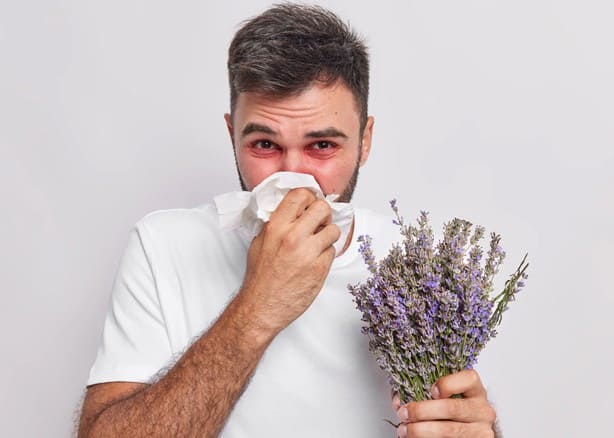- الصحة
- رعاية
- النظافة - الجمال
- Sale طفل / أمي
-
كل العلامات التجارية
- Apaisyl
- Avène
- Bayer
- Bi-Oil
- Bioderma
- Boiron
- Caudalie
- CB12
- Cinq sur Cinq
- Cooper
- Dermophil
- Durex
- Filorga
- Fluocaril
- Gilbert
- Granions Laboratoire
- Hydralin
- Klorane
- Listerine
- Luxéol
- Neutrogena
- Nuxe
- Optone
- Parakito
- Patyka
- Physiomer
- Phytosun Aroms
- Pierre Fabre
- Pileje
- ProRhinel
- Puressentiel
- Quies
- Rogé Cavaillès
- Sanofi
- SVR
- Teva
- Therapearl
- Upsa
- Urgo
- Uriage
- Vicks
- Voltarene
Say something...
Nothing found. Please repeat.
Unsupported browser. Sorry...

Runny nose, repeated sneezing, and itchy red eyes... You may have wondered for a while, if these weren't symptoms of covid 19.
But when your tearful gaze stopped on the calendar, you understood that the pollen season had started!
What is the time of year for seasonal rhinitis?
Seasonal rhinitis usually begins in the spring, when certain allergy-causing trees release their pollen into the air. Subsequently, other allergenic plants release their pollen throughout the summer, until mid-October.
What are the symptoms of seasonal rhinitis?
Seasonal rhinitis causes different symptoms, which are mainly caused by inhaling pollen. Symptoms can take the following forms:
- worsening of asthma, if the person already has it;
- nasal congestion;
- signs of conjunctivitis:
- itchy eyes;
- purulent discharge from the eyes;
- swelling of the eyelids;
- tearing;
- redness of the eyes;
- clear and profuse nasal discharge;
- repeated sneezing;
- headaches;
- tingling and itching of the nose, throat and ears.
The side effects of seasonal rhinitis also affect the quality of life of the allergic person and their family. From spring to fall, daily activities or sports, hobbies and performance at work or school can be disrupted by:
- fatigue;
- irritability;
- concentration problems;
- sleep disturbances.
When to consult
You need to see a doctor if:
- your symptoms persist and affect your quality of life;
- your symptoms are not relieved by over-the-counter medications;
- you do not tolerate the side effects of medications well.
Can seasonal rhinitis cause complications?
Complications of seasonal rhinitis can take the form of:
- recurrent sinusitis;
- Symptoms of Allergic Asthma:
- cough,
- rapid shortness of breath,
- wheezing.
In children, untreated seasonal rhinitis can cause:
- recurrent sinusitis;
- ear infections.
Discover our practical advice
Your pharmacist will give you some tips to reduce the allergic impact:
- Rinse your hair before going to bed to prevent pollen from settling on your pillow
- Avoid rubbing your eyes and wear sunglasses
- Reduce your tobacco consumption so that your bronchial tubes are less reactive to allergens
- Air your room early in the morning
- Avoid drying your laundry outside
- When driving, close the windows
- At home, you can use an air conditioning system that recycles ambient air and includes a pollen filter
Folow Us
Boxed:



